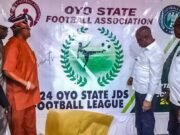The President, Major General Muhammadu Buhari (retd.), has faulted the striking members of the Academic Staff Union of Universities over the prolonged strike that has kept millions of Nigerian undergraduates from school for over seven months.
Buhari who spoke during the 4th national summit on diminishing corruption in the public sector, held at the State House Conference Centre, Aso Rock, alleged that corruption undermines educational policies, and investments and creates an unfriendly learning environment for young people.
Other dignitaries at the event organized by the Independent Corrupt Practices and Other Related Offences Commission, with the theme ‘Corruption and the Education Sector’, were its Chairman, Prof. Bolaji Owasanoye; Secretary to the Government of the Federation, Boss Mustapha; the Minister for Education, Adamu Adamu; and the former Chairman of the Independent National Electoral Commission, Attahiru Jega.
The president claimed that University lecturers were undermining the government’s investment in the educational sector.
“Incessant strikes, especially by unions in the tertiary education sector ctor, often imply that government is grossly underfunding education, but I must say that corruption in the education system from basic level to the tertiary level has been undermining our investment in the sector, and those who go on prolonged strikes on flimsy reasons are no less complicit,” he said.
He noted that the 1999 Constitution places a premium on education by placing it on the Concurrent List, thereby laying the responsibilities of budgeting and underwriting qualitative education on both the Federal and State Governments, stating that the total education, therefore, each year is a reflection of both federal and state budgets and should be viewed with other financial commitments in their totality.
He added, “The allocation to education in the federal budget should not be considered via allocation to the Federal Ministry of Education and also academic institutions aloan one, but should include an allocation to the Universal Basic Education, transfers to TETFUND and refund from the Education Tax Pool Account to TETFUND, etc.
“I am aware that the aggregate education budget in all the 36 states of the Federation and that of the Federal Government, combined with the internally generated revenues of the educational institutions themselves are also a subject that requires the attention of critics of government funding of education.”
The Chairman of the Independent Corrupt Practices And Other Related Offences Commission, Prof. Bolaji Owasanoye, noted that corruption in the educational sector has been rightly described as stealing the future, considering educate tion as the medium for the transmission of knowledge and values.
“Once the education sector has corrupted the foundation for future ethical leadership and la, our force is destroyed,” Owasanoye said.
He noted that corruption in the educational sector manifests in different ways such as recruitment of unqualified or unfit persons to teach,h at primary, secondary, or tertiary levels; admission racketeering, examination malpractice, diversion of revenue for and within the sector, operation of illegal academic institutions especially at the tertiary level, abuse of power and procurement rules by management and governing councils both of academic or regulatory institutions, amongst others.
He also stated that the ICPC has intensified its scrutiny of personnel and capital costs t of MDAs leading to the proactive restraining of surpluses or duplications in the budget.
“Just last week, the commission in collaboration with the budget office and stakeholders, met with some MDAs on the recurring surpluses in their payroll to determine improved measures to improve the budget process.
“This is towards separating outright fraud from administrative lapses. We also actively review the budget to prevent abuse by senior civil servants personalized sometimes personalize budgetary allocation for direct benefit.” He said.
Owasanoye noted that there were two cases under investigation, involving financial improprieties.
Former INEC Chairman, Prof. Attahiru Jega, noted that perhaps, only a commissioned research project would do justice to the issues of corruption in the educational sector, in terms of an expansive critical examination and the specification of a range of requisite recommendations.
He said, “Nigeria has been dubbed as one of the most corrupt countries in the world. It is also said to be one of the world’s most complex corruption environments and perennially ranks in the bottom quartile of Transparency International’s Corruption Perception index.
“This relatively very parer record and ranking is essentially on account of the humongous corruption associated with the Nigerian public sector, especially at the federal level, but also across all tiers of governance in the federation.”
He noted that the Nigerian education sector, especially the tertiary education component, and particles the universities, grew phenomenally, especially since the early 2000s when it was widely opened up for private sector investment and participation.
“Ironically, it was a case of rapid expansion and growth without adequate planning, financing, and careful, effective regulation.
“With the result that, there has not been a remarkable despite enrolment, despite the almost exponential increase in the number of institutions. And, as the sector expanded, seemingly uncontrolled, so has the effect and impact corruption,” he said.
©Punch

































